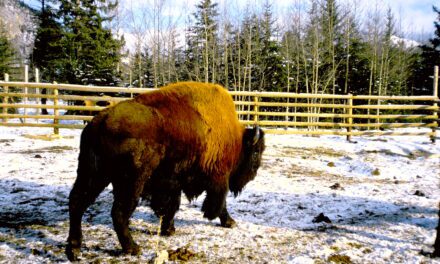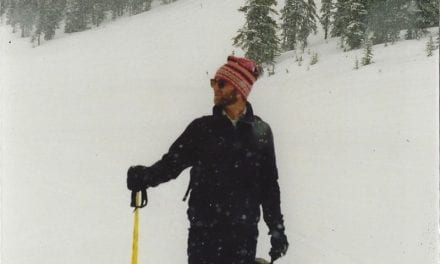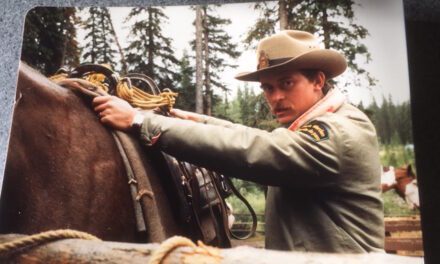SH: How did the Warden Service change over the years? – centralization, affirmative action, focus on public safety, changes in 1990s & 2000’s. (Tape 4:45)
Paul: To me there was too much specialization I guess, which it had to go that way anyway, especially the way the climbing was going. Super dooper law enforcement. At the start there, the enforcement end was more of an informative thing. I remember Wally McPhee, telling us that’s the way they wanted it. Just inform people what was going on, not charge them with all this stuff. And back then it worked really good. But as far as the climbing and all that goes, it had to get specialized. The basic rescue stuff, just getting people that were hurt was okay, but when you had to go start picking them off the face of the mountains and stuff, cowboy boots and a can of snus (smokeless tobacco) didn’t cut the mustard.
SH: Yes the clientele changed and there were more of them. How did your relationship with the Warden Service change over the years?
Paul: I guess the political end of it probably was ….I was a guy who didn’t like change too much anyway, and then you get somebody in there that wants to enforce which way you’re supposed to comb your hair or whatever. Back to stupid neckties and all that crap. Like I said before you put that on so some ping ponger can take your picture driving around in your fancy little pick up truck. But my main thing was I really preferred to be out in the bush and not kicking hippies off the lawn of the administration building.
SH: So you went from being a park warden and bought Timberline Tours?
Paul: Yes, I was wheeling and dealing on that at the same time Donny Mickle was getting into the Warden Service. We’ve talked about it lots since then. Donny said “I always wondered who was making the wrong move – me or you. I think it was me.” But it was actually his mom and dad’s outfit that I was getting. I started dealing with his sister and her husband. They’d split up and she was trying to run it all herself. I started just dealing with the backcountry stuff …. The trip stuff. We had it set up that that fall I was going to get that and she was trying to run the pony barn and stuff. I was shoeing for her in the evenings, trying to help her out. But in the fall, we were having our little get together and she just said “Do you want the whole thing?” And I thought about it for about two minutes and said “Ya okay.” So that was that.
SH: When would that have been?
Paul: 74. Fall of 74.
SH: You would have known all the country out there so that would have been very handy.
Paul: I knew a fair bit of it.
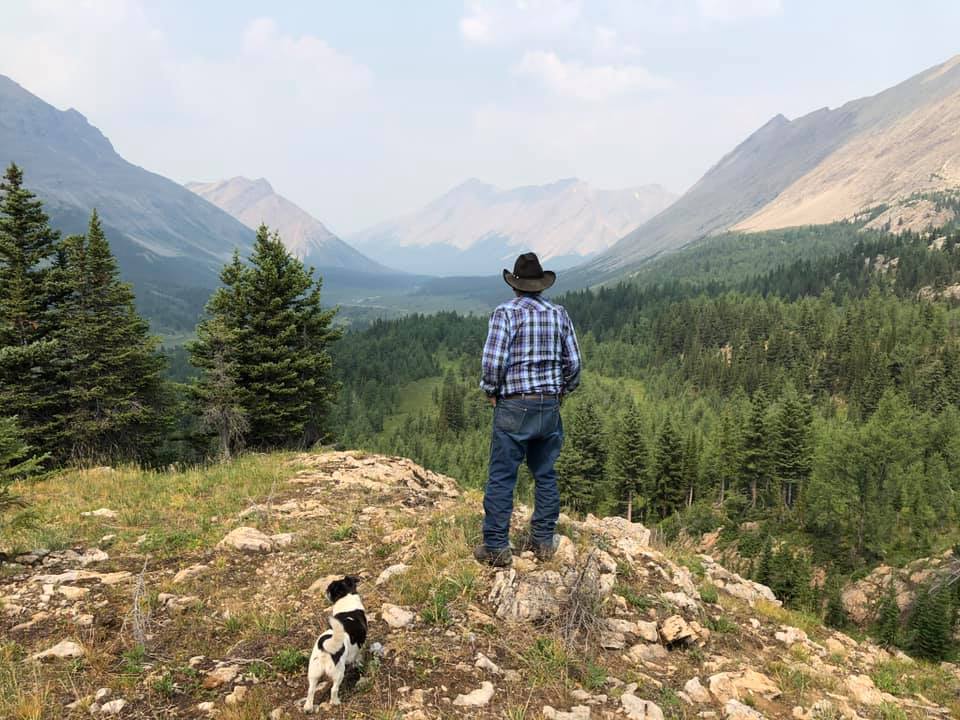
Paul and companion – looking towards the Pipestone. Photo courtesy of Susan Peyto.
SH: And did you know the backcountry wardens that were out there.
Paul: Ya, I was at Cyclone and Pipestone for a while when I was a seasonal and stuff so a lot of that country I’d been through before that.
SH: So when you took over Timberline Tours were the camps already in there … the backcountry camps? Paul: Not like now. We had areas but it was way better. You could, you know, actually up the Pipestone at Point Camp there, that was actually the horse grazing area where … they used to just turn horses loose there. When you were done with them in Lake Louise you would take them up there and you could kick them loose. We used to trail the horses … they used to winter at the Corners, south of the (Ya Ha Tinda) Ranch there, and we used to trail them back and forth from there to Lake Louise. But that was when Mickle’s had it and then Graham McAssey, he had it before them. The horses, they wintered out there all the time, Assiniboine horses were there and Martins from Banff.
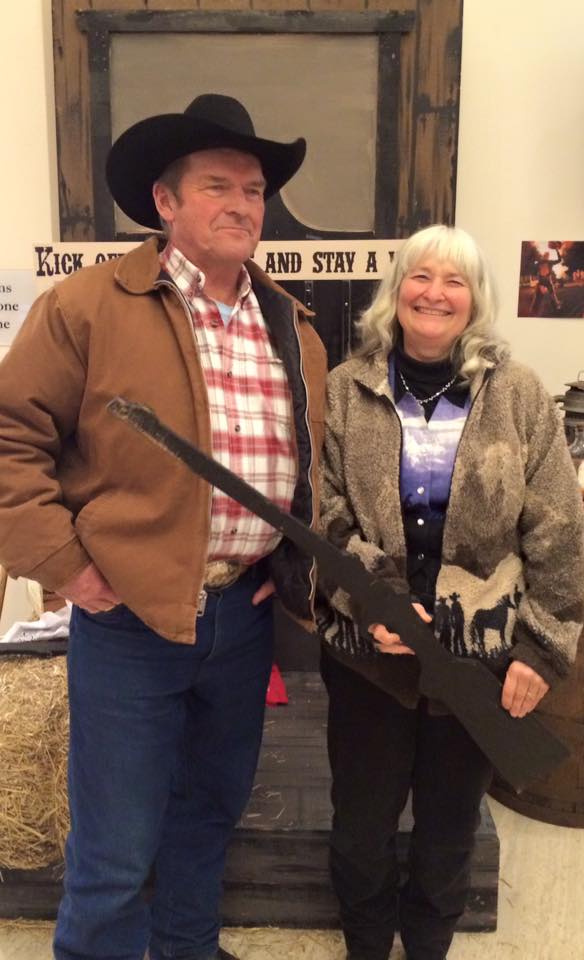
Paul and Susan Peyto Photo courtesy of Susan Peyto.
SH: I didn’t know Assiniboine even had horses.
Paul: Ya, that’s how everybody used to get in and out of there – up Brewster Creek and Allenby and Floyd Smith used to take some people in from Canmore through Bryant Creek, up that way.
SH: So you bought Timberline Tours so you went to being an associate from being a warden.
Paul: I had the chance to get into this business and do more what I wanted to do. Lots of times they were coming to me asking where the hell this trail is and that trail is, when they got new wardens out there for two year stints. I knew my way around there fairly good.
SH: What about the Warden Service was important to you? – Idea of protecting and preserving national parks, keeping people safe etc?
Paul: Preserving the park and the wildlife and all that stuff. Even back then there were a lot of wing nuts out there that didn’t care what they were doing. I guess informing the public a lot of times about different things – the way they camped, shit like that. You know …. like the Indians say about the white man building a great big fire and standing way back.
The main thing for me was just the way of life that could have been, the way it used to be. I always say I wish I was here a hundred years earlier.
SH: You are indeed your uncle’s nephew then… Wild Bill.
Paul: He was my great uncle. But my grandfather was in the Warden Service too. Walter. I’ll tell you a story about him. (Tape 15:50)
This is from when we were kids. Across Beaver Street in Banff where we used to live up on the hill there. There was me and another guy that lived three houses down Banff Avenue, and the guy that lived up over top of the hill on Muskrat Street…we were up on this hill burning these red ants with matches.
SH: Boys will be boys
Paul: Oh ya, and there was this huge ant hill there. So we were out playing and burning these things and we got all this grass on fire and we’re stomping on the grass trying to put it out. It’s behind us and everywhere else, so then we thought we had best get the hell out of here so Gord, he went back down Banff Avenue, the back way to his house, and I went up over the top with Doug Walls, and down Muskrat Street and down Banff Avenue. My grandfather Walter, lived on Banff Avenue right across from us, which was right across from this hill. I went down there, on Muskrat and Banff Avenue, and came up the other side of Banff Avenue from where the smoke was coming from, up Martin Street, the back way, up his driveway. The fire sirens were going off up town and grandpa goes out there to see what’s going on and he can see everything. I come in the back way, and go and stand beside him out on the sidewalk on Banff Avenue. We’re looking at this thing and the fire trucks are coming and he says “I wonder what little bastards lit that thing on fire?” I still remember him looking down at me …. And he was right.
SH: Are there any legends or stories associated with the Warden Service that you could share? Anyone from the Warden Service that stands out in your mind?
Paul: Well there’s guys I had some entertaining trips with. I guess Jim Rimmer stands out in everybody’s mind sometimes. Somewhere I have pictures of him and I skiing on the ski hill at Cuthead College up the Cascade … trying to teach Rimmer how to ski. It never did work.
SH: Okay, let’s have a Jim Rimmer story.
Paul: Well he was a story from start to finish. He could get himself in trouble without even thinking about it. One time at the Crossing, Rimmer was there and Gilmar was there and I was there. Rimmer was going up the Howse with his two pack horses and his dog Spook. He wanted Larry to film him, with a movie camera, crossing the Mistaya. So we go over there …. Larry and I we walked over there, and he comes with his horses. The river was fairly high and he goes in at the fastest part of it too. He’s trying to get organized and get across the river. He gets going in there and Spook gets washed down the river and there’s this one pack horse coming back. Rimmer is saying “Not now, don’t film it now!” Rimmer ends up over on the other side, his pack horses are back on the side he started, his dog is down by the North Saskatchewan. It was hilarious.
Another time there at the Crossing we were in what we called the new house. Rimmer was in the old house. We were in there after lunch because Larry lived in that house. We hear the ski doo running. We had an old double track ski doo in the garage. Rimmer has got the truck backed up to the door and he’s going to load this thing. Larry heard the ski doo and said “Watch this”. So we’re looking out the kitchen window by the sink and smoke is coming out the door of the garage. He revs this thing up and comes flying up the ramp. He hit the front of the box with the front of the ski doo. Just about went over the front of the cab of the truck. Larry and I were laughing so damn hard. We ducked down out of sight because he’s looking around to see if anybody was watching. He was always entertaining that’s for sure.
He was telling me one time he was by himself going up Flints Park with Walter Perren’s old dodge pick up truck. They had slide-in stock racks for one horse. Rimmer would never tie them down or nothing. He was going up there and I think he had Bogs his horse in the back. He was looking around and ran into the ditch with this truck. Bogs didn’t like that. So the horse can’t get his footings and he’s in the bottom of this right angled deal on the floor on his side. And they were sitting there like that. Rimmer was telling me “I didn’t know what the hell I was going to do.” But he managed to back it out of there, and got it standing upright. Horse was okay. It was a good thing it was that horse though. His other one, Cinders, used to buck him off all the time. It would buck him off in the morning and he’d say “Okay Cindi now let’s get going.”
SH: That’s an interesting way to start your day. Is there anything about the Warden Service, as you knew it, that you would want future generations to know? (Tape 23:02)
Paul: I won’t answer that. Laughs. In the old days it would have been really good. But now … these little rent a cops they got now …. I don’t know.
SH: What made the Warden Service such a unique organization?
Paul: Good question. I think to start with the type of people that were in it. They all basically come from an outdoor background I thought anyway, and that was back when people had common sense. Now that’s extinct. Even then there was a few that didn’t have a whole bunch of capability.
SH: Do you have any lasting memories as an associate with the Warden Service? Favorite park, cabin, horse, trail, training, rescues, people, humourous stories, etc.
Paul: Humourous? Well Gilmar and I when we were at the Crossing, we had to pack a bunch of these bearded hippy archaeologist guys up the Howse River for a few days. They were all staying at the cabin there and camped there and stuff, at the old cabin. I think they were from the University of Alberta. We packed them in there and that. Then the one morning … we kicked our horses out at night. The pasture was up above the cabin and it went around a little bit of a corner but the river was the boundary on the other end. So Larry and I we go walking out there in the morning figuring the horses are just around the corner and we get up there and there’s no horses. So I thought “Great”. But we see tracks going up the river, still on the cabin side. So we were tootling up there but we didn’t have a halter, bridle, nothing with us. So we get up there a ways, my saddle horse had a bell on her ….. there’s a few of them there … and another one he had a bell. They’re all hobbled and stuff. I said to Larry “We should catch my horse and lead her with my belt through the bell strap so they don’t go across the river on the way back.” So I’m leading old Bridgett and sure enough they go across the river. So Larry says “Now what?” And I said “Well let’s just put a belt around her nose and up through the strap. So both of our belts were together and Larry got on and I got on, and we’re going through the river. We get them headed back across the river again to the pasture. The start of the pasture is pretty boggy but our plan was as soon as we got across the river …. Because we were a wreck just waiting to happen, the plan was to get off when we got through the river. So we got through the river and Larry says “Let’s get the hell off.” I said “Well let’s at least get on solid ground”, and Larry said “That belt is going to come off her nose.” It was working its way down on her nose. I said “She’s a good horse, we don’t need that anyway. I was just being a smart ass.
SH: So there are two of you on this horse’s back?
Paul: Ya, and this belt it finally slips off the end of her nose. All the other horses were gone, so she wanted to go and this belt strap just came off her. She took off and there’s all these little spruce trees in the pasture. She’s going and we’re still sitting up there and we know that we are going to crash so hard. So we get just about to the cabin going through these trees and stuff, and she stuck her head down and just blew up. We went flying up through the air and we land side by side on the ground, Kaboom!. I looked up and all these bearded wonders were leaning on the fence because the horses had gone into the corral and were coming back out again. I said “Larry we better do something because they’re all leaving again!” He said “Jesus Christ, I can’t even move.” So I get up and gibble around until I get them stopped. Larry said afterwards “I wouldn’t even be hurting if you didn’t land on top of me. But I didn’t land on him, we were side by side. But all these guys watching ….to be watching it would have been just hilarious.
But then his wife Pat, she was working at the resort, at the Crossing. We were gibbled up a bit. I had a bruise on the side of my hip from when I hit the ground and he pulled a bunch of muscles in his back. I remember having to climb up on a block of firewood to get on the damn horse … we were there for another two days after that. So we had to pack these guys out of there. But when we got out we went up to the resort for coffee, and Pat’s working behind the counter. She sees us gibbling through the door and she starts to laugh. She says, “What did you two do now?”
SH: No Workers Compensation claims in those days.
Paul: No, it was hilarious. (End Section 3 Tape 31:05)
SH: Do you ever miss not being associated with the Warden Service or being a Warden?
Paul: Maybe a little bit right at the start, when I first got going with Timberline Tours. It was pretty tough to get anything with the outfit. But overall I’d say very, very little and as the years went on a lot less. You’d see the changes and stuff, the guys you see out. Before you used to know everybody that was driving a warden truck. Now, I might wave at a Parks truck just to waive at a truck, but that’s about it. Because you don’t know who the hell is driving it.
SH: Do you have any photos of yourself that you would like to donate to the Project, or that we may copy? Do you have any artifacts/memorabilia that you would like to donate to the Project (Whyte Museum of the Canadian Rockies will archive these)
Paul: Yes I was thinking about that yesterday, but I’d have to do some hunting.
SH: What year did you retire? Well I guess you haven’t retired. But you got out of the Warden Service in 1970??
Paul: In 1974.
SH: So are you going to keep doing Timberline Tours or are you trying to sell it or ?
Paul: I’m still moving. I still like, to me I just feel at home in the hills … in the mountains. Usually every spring I’m itching to get going again. When I was still going to school in Banff, in high school, I remember one spring I was looking out the window, not paying any attention to what I was supposed to be doing. I was thinking about how nice it would be to take a saddle horse and a couple of pack horses, and just bugger off for the whole summer. I didn’t realize I’d have to be taking all these goddamn people with me to do it.
SH: Where does most of your clientele come from? Are they American or ….
Paul: Everywhere, we get lots of them, but we get a real mixed bag. Now you get a lot of different shades of suntanned people I’ll tell you. Not so much on pack trips but on the day rides. It’s everything under the sun.
SH: What do you do in the winter?
Paul: In winter I’m still looking after horses quite a bit but I still go up north of Yellowknife for a while. I’ve been running the snow-cat crew building ice roads for the diamond mines. But that’s usually a month, or six weeks depending on snow and ice. Last year was not good because we only had a couple of weeks and didn’t have enough ice to work on. You kind of want to have hard water when you’re up there. Before in winter I was grooming at Louise at the ski hill there, lots. Delivering snow cats for Bombardier. I did a bunch of demo driving and stuff for them.
SH: That must be fun driving all those big snow cats around.
Paul: It was neat because I’ve seen a lot of changes in that stuff. When Johnny Nylund was driving snow cats at Louise years ago, they just had the old Tuckers (Sno-Cat). The Warden Service used to have the old Tuckers. Somewhere in my collection I’ve got pictures of Andy Anderson running his snow cat skiing thing on the back side of Deception Pass with a Tucker. But we won’t mention that. That was back in the days when you could have fun.
